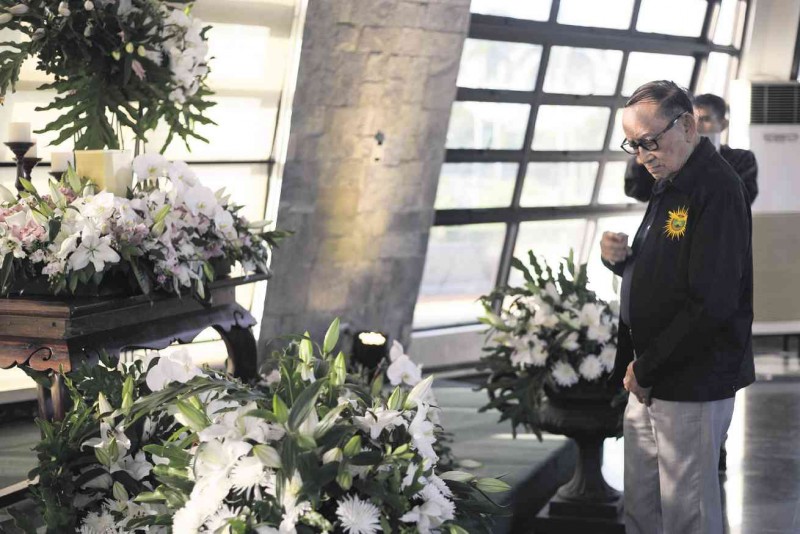Mourning LJM

TWO EDSA ICONS Former President Fidel V. Ramos views the flowers surrounding the capsule that contains Magsanoc’s ashes. The two have been described as icons of the Edsa People Power Revolution. ELOISA LOPEZ
We are in a state of mourning. There is a sense of vulnerability pervading the newsroom that editor in chief Letty Jimenez-Magsanoc once dominated in ways now being ardently remembered, as well as a sinking realization that an absence planned as merely momentary has been made permanent and final.
The morning after is unnerving, and the women and men of the Inquirer are going about their work as though on autopilot. There are issues and events to be covered and reported, photos to be taken at Henri Cartier-Bresson’s “decisive moment,” analyses to be run. There is hardly time for more tears—though, at odd moments, such as when glimpsing the lit candle flickering atop LJM’s desk, they spring and flow. Even she would frown on grief lingering more than it should—though she was no stranger to sorrow.
We are covering this state of mourning—though we be mourners ourselves: observers and participants of this sudden disruption of life, what Nadine Gordimer noted so precisely as the constant state of tension in the writer (and by extension the journalist). We, along with her other admirers, are caught in the vise of remembering; it’s a ceremony both obligatory to us who belong to the calling that is journalism, and comforting to us who are, like many others, profoundly bereaved.
In remembering, we are celebrating LJM’s life, which is as storied, and as ripe for lessons for us and those who will come after us, as they come. At a Nobel Prize lecture she delivered in 1991, Gordimer said: “Being here: in a particular time and place. That is the existential position with particular implications for literature.” Given the Philippines’ recent history, being here, in this particular time and place, also has particular implications for journalism, as the singular role of this newspaper illustrates.
Would it be an exaggeration to say that the Inquirer is LJM’s newspaper? We think not. She was present even before its creation, when its predecessor, the Philippine Weekly Inquirer, rose to the terrible occasion that was the assassination of Benigno Aquino Jr. in the way other martial-law-era publications could not, or would not. When she was named acting editor in chief of the Philippine Daily Inquirer in 1991, she wrote about the necessity of editors keeping readers firmly in mind:
“The post-Aquino reportage neither reported your (readers’) outrage nor put a name to your fears. It offered no meaning to the courage of your doubts. You did not find in your newspapers the answers to your questions which had to do mainly with what was happening to the country and what was happening to our lives.
“You demanded that the media do their job. You demanded to know the truth. You went straight out to the streets to denounce the controlled press and to boycott it.
“Indeed, in the world of news it takes two to tell the truth. We in the media have the responsibility to report the news accurately (and with fairness which follows accuracy) and completely (subject to space and deadlines).
“Your responsibility as readers is to keep yourselves informed. Remember that in this country of dangerous uncertainties and of many disasters, natural and manmade, what you don’t know can kill you.
“It is important to make this distinction. We are not the bad news; we only report it.”
That challenge—for challenge it clearly was, flung at both journalists and readers—was nothing startling. This woman, after all, was a veteran of the resistance against the Marcos dictatorship that imposed a strictly-good-news policy on the media. In 1981, as editor of Panorama magazine and beleaguered by the Marcos apparat, she wrote:
“We accept government as a source of news but it is also its bounden duty not to deny news from other sources, no matter how unfavorable to its aspirations. It is unreal to even suppose that the government is the lone repository of the truth. It is good for any society when its government allows for a choice of viewpoints. It may shake up that society but it can only come out of that clash of opinions invigorated and stronger and united than ever. If that society’s government collapses, don’t blame the dissent that started it all as recorded in a free press. That government must have been puny and weak to start with, and buckled under the convulsion caused by the outpouring of divergent ideas.”
This stance, this mission—of putting out a newspaper carrying ideas that may be deemed subversive by the status quo—marked the way LJM ran the Inquirer, and which made it into what it is today: No. 1. The pork barrel exposé—the “grand dame of Inquirer scoops,” in her own phrase—is the latest in the newspaper’s efforts to tell the nation of what had been going on. It was, she said, “a solid validation of the long-held, collective suspicion of the rampant corruption across all branches of the government, of the rotten system that allows, nay, entitles, lawmakers to identify and allocate funds for their favored projects in their endless pursuit of fat commissions.”
But LJM’s gone, and we are in a state of mourning, suddenly diffident before the stealthy sweep of mortality and looking to one another for signals of strength. How she would be nonplussed at this suggestion of flagging resolve among her people. In the morning that comes after a gray dawn, we will pick ourselves up and proceed as we were taught: “courage in one’s life and talent in one’s work” (Camus) and “to say the unsayable, to speak the unspeakable, to ask difficult questions” (Rushdie).
RELATED STORIES
‘Courage beyond words’ sums up LJM’s life—UP-CMC















